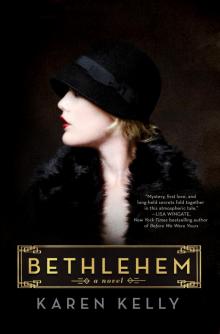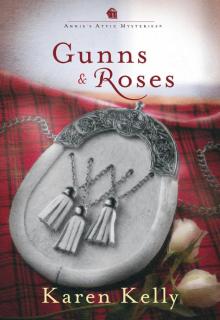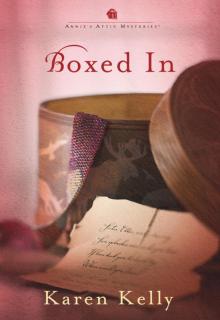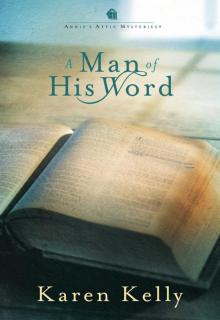- Home
- Karen Kelly
Bethlehem Page 2
Bethlehem Read online
Page 2
In Joanna’s opinion, the word uncomplicated would never be used to describe her mother-in-law. It wasn’t that she was temperamental or unbalanced or even difficult—but she was private to the point of being enigmatic. Just the other day Joanna and the children had come upon her on the landing of the grand staircase at Brynmor. She seemed frozen there, staring into the distance as she grasped the banister. She didn’t even notice the trio coming down the stairs until they were practically on top of her. She flinched when she finally saw them—snapping out of it like a parishioner caught nodding off during the sermon. There was a slightly awkward rite of small exchanges—“how are you today … we’re off to the library … enjoy yourselves”—but her gaze fixed oddly on Charlie. It was strange the way she looked at her small grandson. Joanna had noticed it on some level before—a fleeting, private wistfulness in the wake of an unguarded moment. It had registered with Joanna formlessly, like a low, melancholy chord from some distant requiem.
Doe sighed, pulling Joanna back into the moment. “I suppose we’re all tempered by the trials we’ve faced.…” She rested her gaze on a nearby oak, majestic in its twisted expanse, and her next words were uttered almost under her breath: “Some more than others.” Rather abruptly, she moved on. “And how do you find living at Brynmor?”
Hesitating slightly, Joanna gave a meek shrug. “I guess I’m still getting used to it. I thought—we thought—that moving here would make things easier, what with the commute and Frank traveling so much. He had been talking about it for a while, and I was starting to see his point. I’d never considered that we wouldn’t have a place of our own, but after his father died, Frank felt that he couldn’t leave his mother and grandmother in that big house by themselves. It all got decided so fast—” She stopped, mindful of her audience. If Doe was, indeed, a friend of Frank’s grandmother, she didn’t want to put the wrong foot forward. But she needn’t have worried—her new acquaintance was sympathetic.
“I imagine it’s not easy. The position of mistress of the manor has been filled—we are no longer accepting applications,” Doe intoned dramatically.
Mistress of the manor. Joanna wondered to which mistress Doe was referring. The idea of moving into the family home—the venerable, imposing Brynmor—was overwhelming in itself. But the fact that her curiously unfathomable mother-in-law lived there too, along with Frank’s impeccable grandmother, placed Joanna in the tricky situation of living with two mistresses, as it were.
Brynmor was not Susannah’s house, not yet. It belonged to her aging mother, Helen—known to close friends as Hedy. When Hollins Parrish died, Susannah and Wyatt had tried to convince Helen to move in with them. Their own home was only blocks away on Wyandotte Street, and although it did not have the grand privilege of bearing a name, there was more than enough room for all of them. But Helen had refused to leave. She missed her husband terribly—they had been together for nearly sixty years—and the idea of moving out of their home was untenable.
Of course, she wasn’t entirely alone. There were still house and grounds staff—maids and gardeners and a cook and a driver … but servants notwithstanding, the house was ridiculously large for one elderly woman. And then, the following winter, Helen fell and broke her hip.
Susannah’s sister, India, who lived in Baltimore, was the one to suggest that Wyatt and Susannah take over Brynmor instead. India and her husband, Paul, had never had children and they traveled extensively. “We have no intention of returning to Bethlehem,” she’d stated emphatically. “And you know Kit has no interest.” Their brother, Kit, had long ago moved to South America to run a large iron-mining operation, and had put down deep roots. “Sell your place and take Brynmor,” India had insisted. “It’s yours. We don’t want it.” The obvious implication was that neither India nor Kit was particularly eager to suffer the upheaval and shoulder the responsibility of caring for their aging mother, and so the bargain was struck.
It was a cruel twist that left the two women alone together, so to speak, when Wyatt died just three years later. And that was when Frank sat Joanna down one night in their moderate and manageable home in Chestnut Hill and confessed his guilt and worry about leaving his mother all alone with the burden of caring for Helen.
To be fair, Joanna should have seen it coming. Moving to Bethlehem had been a discussion topic for some time, and to say that Brynmor was large enough for all of them was an understatement. Certainly, there were items in the “against” column. All of their furniture—the things she had chosen so carefully to make their house a home, things that had come to represent their history—would have to be sold or stored. And there were Joanna’s parents to take into account. John and Eileen Rafferty lived in South Philadelphia—a retired policeman and his devoted wife. They relished the privilege of proximity, and they doted on their grandchildren. It would be a big adjustment for them, but Bethlehem was less than two hours away—it wouldn’t be an impossible hardship to visit back and forth.
Well, that was all in the rearview mirror now. But Doe’s teasing articulation made a point. Joanna responded with a weak smile: “Mistress of the manor. Are you referring to Helen or Susannah?”
Doe chuckled. “You do have a sticky situation, moving into a hive with two queen bees.” She gave Joanna a complicit wink. “And it would be an adjustment for most anyone to call a house like Brynmor home.”
The words were welcome. It wasn’t Joanna’s home. Her in-laws could never be accused of being unaccepting—they were far too gracious to make Joanna feel like she was less than they were by virtue of her modest background. But there was just a way of being—standards and expectations and assumptions—to which she was alien. She was the daughter of a Philly cop. She was a nurse. She had put herself through school, working in the evenings at Bullock’s Drugstore and then at Penn Hospital, where, after graduation, she’d taken a full-time position on staff in the orthopedics ward. That was where she’d met her husband. When Frank was seventeen, his father had taken him on his first assembly-line tour at Bethlehem Steel. Seven years later he’d needed one final surgery to repair the damage done by the steel railcar wheel that had fallen off the conveyance, crushing his foot.
It wasn’t long before her patient moved out of bed 2C and began to turn up regularly at apartment 4D. And now here she was, transported from that cozy apartment in Philadelphia to the grand manor that was Brynmor, and despite Frank’s repeated assurances that his family—what remained of it—was delighted to have them there, she couldn’t help feeling like an outsider.
“The house is lovely, of course, and I’m glad for the chance to get to know Frank’s grandmother better while I can.…” Too late, she realized the implication, and cringed. Helen and Doe had to be roughly the same age. Sheepishly, she continued. “But I’ll admit, I’m finding his mother a bit … formidable. I guess I’m a little intimidated. She’s just … hard to know.”
Doe looked pensive. “Scratch the sphinx and spy the sparrow,” she said cryptically.
“Excuse me?”
“I’ve learned a thing or two in my antiquity—chief among them that things are seldom what they seem. Often the person who appears the most … impenetrable … is, in truth, the most fragile.”
Things are seldom what they seem.… Joanna could hear the music as plainly as if she were on the gymnasium stage, playing Buttercup in her high school production of H.M.S. Pinafore. The lyrics tiptoed through her memory in their ominous, staccato whisper, then swelled to a resonant augury:
Tho’ a mystic tone I borrow, you shall learn the truth with sorrow. Suddenly Joanna felt a strange sense of foreboding. With an uneasy glance at the surrounding graves, she straightened her shoulders and changed the subject. “You mentioned a family resemblance in Charlie,” she said, clearing her throat as she looked across the expanse toward the distant trio of gardeners. Her head tilted as she regarded her young son—slender and knobby-kneed, dark hair gleaming in the sun. “I’ve never been able to figure out who he resembles.
I can’t see myself or Frank.”
“Oh, there’s a resemblance, all right.” Doe nodded. “That little boy looks exactly like Chap Collier. Anyone who was around way back when would see it.”
Joanna tried to remember if she had ever seen a photo of Chap. She knew her father-in-law had a brother who had died young—a brother named Charles but called Chap. When Frank wanted to name their son after his paternal grandfather, Charles, it hadn’t occurred to Joanna that the baby would also be named for Frank’s long-deceased uncle.
Then she thought of the traces of her own brother, David, in his little namesake. Daisy was actually Davida, in honor of Joanna’s only sibling—struck and killed by a car when Joanna was seven. She had felt a wrenching twist in her heart the first time she saw him in her daughter’s deep dimples, and the little wrinkle on the bridge of her nose when she smiled. How strange—almost mystical—that each of her children would resemble the ancestors with whom they shared a name.
Looking at her watch, Joanna realized that half an hour had passed since Charlie and Daisy had been foisted—however charmingly—upon Daniel. She thought of Doe’s bucket and spade, abandoned by the swing. “My goodness—you must have things to do. And I’m sure Daniel has had enough ‘help’ by now.”
Doe rose slowly, placing a hand on her lower back. “A fine reward for all those years of stooping,” she said, turning toward the house. “Looks like he’s finally tackling the rosebushes.” She ushered Joanna to a path that led to the backyard of the house, although yard wasn’t really the word for it, as it wasn’t delineated in any proper way from the graveyard itself. There was a barbecue grill just a few paces from a carved statue of a young girl holding a basket of flowers—a graceful tribute to someone once named Gertrude Schaller, who’d died in 1918. Other headstones of varying sizes were sprinkled right up to the house. Charlie was holding a gunnysack as Daniel clipped the thorny stems, but Daisy was off in her own world, kneeling next to a small granite headstone. The little marker was situated right next to a wrought-iron garden table and chairs. As the women approached, she jumped up and ran to her mother.
“Mama, come and see this. I found a little baby grave. It doesn’t have a name. Just ‘Baby.’”
“It does too have a name,” Charlie called over his shoulder. “Just not a first name. It’s Baby Hayes.” His tone was slightly condescending.
Daisy took her mother’s hand, practically pulling her to the marker. Pointing solemnly to the brief epitaph, the little girl leaned down to pat the stone. “Poor Baby Hayes. Didn’t you have a mama?”
It was strange and sad; the absence of identity struck Joanna. There was no other inscription—no sweet send-off quoting Matthew 19, no carved angels, not even a date.
“Of course it had a mother,” Charlie said. “Babies can’t be born without a mother, ding-dong.”
Concern overrode umbrage, and the mild insult rolled right off Daisy’s back. “I wouldn’t like to be called Baby. If I had a baby, I would give it a name.”
Suddenly Joanna had the pressing urge to move along. The peculiar events of the afternoon had left her feeling disconcerted and vaguely anxious. “I guess we’ll never know, but what we do know is that we need to let these nice people get on with their business. You two could use a bath before dinner.” She took Charlie’s hand as he put down the gunnysack, but Daisy was reaching up to give Doe’s gardener’s apron a little tug.
“Do you know who Baby Hayes is?”
As the words left Daisy’s mouth, Doe’s open, sunny countenance clouded over. She rested her hand lightly on Daisy’s head, and her voice was soft. “In this world, petunia, there are some things we’re just not meant to know.” She turned away, readjusting her apron, and then said, “I’d better go check on my patient—the boss is down with a cold today.” She gave a little wave as she climbed the short stairway to the back door. “Don’t be strangers—there’s plenty more fun where that came from,” she said, nodding at the gunnysack stuffed with bramble.
Joanna and the children waved back as Doe disappeared into the house. Above them, two birds began to quarrel, darting at each other with peppery commotion. Suddenly one of the small, feathered missiles dropped from the sky, saving itself in a last-minute swoop that brushed Joanna’s cheek, shivery and repellent. “Oh!” She gave a little shout, instinctively crouching. Charlie reached out to his mother in alarm, but Daisy just laughed at the spectacle.
“There is special providence in the fall of a sparrow.” The words came low and portentous. Daniel was watching with serious eyes, but as Joanna straightened and visibly shuddered, he drily raised a brow: “Hamlet.” Then he tipped his hat with courteous formality, and Joanna was struck again by the unsettling, lucid directness of his gaze. Her back stiffened as she turned away, a reflexive response to the prickly feeling that some private part of her was exposed.
Two
AUGUST 1918
“I could put the worm on by myself.”
“No.”
“Come on, Kit, just for a little while.”
“You said you just wanted to come along and watch. I’m not here to watch you drag a line.”
Susannah angled her foot to create a wake in the warm August water. “You’re just afraid I’ll get a bigger fish.” She leaned back on her elbows and turned her face to the sun, a sham pose of serenity that she held for only a few moments before her hand shot up and batted the cork handle of the fishing rod.
“Knock it off, Sass.” Kit lunged to grab the fishing rod before it sailed into the river. “You’re lucky that didn’t go in. You’d be next.” His patience with his little sister was wearing thin.
“You can hold my pole,” Wyatt said from the opposite corner of the raft, then looked down quickly as his words registered.
Explosive laughter split the heavy summer air as the two older boys slapped their knees and doubled over. “I’ll thank you to keep your dirty propositions away from my sister,” Kit said, practically choking.
Chap shook his head in disbelief. “Cripes, Wyatt, you say the dumbest things.” But he was smiling at his brother, and reached over to give him a fond shove on the shoulder.
A deep shade of red would have been visible to anyone standing on the banks of the river, had they noticed the boy on the front of the raft with his face turned toward the water.
“You two are horrid. Poor Wyatt. Just ignore them.” India stood up gingerly, taking a couple of careful steps to the other side. She sat down next to Wyatt and patted his back. “I think that was sweet. I’d like to try my hand, if you don’t mind.”
This provoked another bout of uncontrollable mirth. Chap had to sit down, holding his shaking sides, and Kit hid his face in the crook of his arm. “Oh dear God.” His voice was muffled.
Taking the fishing rod gently from Wyatt’s hand, India said, “Don’t pay any attention to Kitty. He’s just a mean old cat.”
Kit bristled. India knew exactly how to get under his skin. “Don’t waste a perfectly good night crawler on Itty,” he scolded Wyatt. “She wouldn’t know she had a bite if it took her arm off.”
India turned and raised one eyebrow at her brother. “Meow.”
Kit glared at her. “Itty-it.”
The Parrish family, with its long history of carrying given names down the line, had a penchant for nicknames. As the fifth Hollins Parrish, Kit’s was selected from the rather limited options yet available; and Itty was simply his toddler interpretation of his baby sister’s name. Given India’s diminutive stature, it stuck. When Susannah came along, it took her almost no time to earn her sobriquet. Emerging from an exile prompted by naughty misbehavior, she had leveled her three-year-old gaze at her mother and demanded an answer: “Are you ready to be nice now?” From the start, Susannah had a bold and disarming sassiness that could charm a Gorgon.
She now pulled her foot out of the water and sat up, stretching and yawning. “I could probably catch a fish with my hand before any of you get even a nibble.” She leaned ov
er to dangle her fingers in the water.
Wyatt turned around to watch her, a habit he seemed unable to shake. From the moment he had laid eyes on Susannah, his compass could point in one direction only. He had fixed solidly on his true north, and the arrow hadn’t so much as wiggled over the past four years.
The Collier family had come to Bethlehem on the galvanizing thrust of the war in Europe. In 1914, Bethlehem Steel had begun to roar with warfare’s terrible bounty—both England and France were placing orders for ordnance, and stock was nearing six hundred dollars a share. At the helm of the company sat Hollins Parrish, who took personal responsibility for ensuring that his new head engineer—one with the best faculty and expertise in the industry—was received with warmth and favor. Welcoming Charles to “the company” meant that he and his wife, Frances, and their sons, Chap and Wyatt, were also welcome to the baronial and bustling Brynmor … and to Helen Parrish’s splendid table.
In the course of the past few years, the families had become inseparable. Hollins and Charles not only worked side by side, they were dedicated golf and squash partners. Helen and Frances played in the same canasta group and were officers in the Ladies Auxiliary and the Bethlehem Garden Club. But the friendship between Chap Collier and Kit Parrish was closest of all. Each was an eldest child and each bore his father’s name—a mantle that came with both enormous privilege and daunting expectation. Perhaps it was this common circumstance that produced the brotherly bond, or perhaps it was the happy fact that they both possessed an easygoing, charismatic confidence. In any case, they shared nearly every experience and the admiration of their friends. These days, however, they also shared a nearly complete disregard for younger sisters. While they were usually good-natured about letting Wyatt tag along, the older boys wanted very little to do with India or Susannah. In fact, at age sixteen they would have more willingly taken the town librarian on their fishing expedition that morning, but they had been blackmailed by a twelve-year-old girl, and Susannah had magnanimously shared the ransom with her sister.

 Bethlehem
Bethlehem Gunns & Roses
Gunns & Roses Boxed In
Boxed In A Man of His Word
A Man of His Word